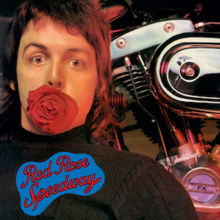| Red Rose Speedway | ||||
|---|---|---|---|---|
 | ||||
| Studio album by | ||||
| Released | 4 May 1973 | |||
| Recorded | March–June and September–December 1972 | |||
| Studio | EMI, Olympic Sound, Morgan, Trident and Island, London | |||
| Genre | Soft rock[1] | |||
| Length | 42:13 | |||
| Label | Apple | |||
| Producer | Paul McCartney | |||
| Paul McCartney and Wings chronology | ||||
| ||||
| Singles from Red Rose Speedway | ||||
| ||||
Red Rose Speedway is the second studio album by the English-American rock band Wings, although credited to "Paul McCartney and Wings". It was released through Apple Records on 4 May 1973, preceded by its lead single, the ballad "My Love". By including McCartney's name in the artist credit, the single and album broke with the tradition of Wings' previous records. The change was made in the belief that the public's unfamiliarity with the band had been responsible for the weak commercial performance of the group's 1971 debut album Wild Life.
Before recording the album, Wings recruited lead guitarist Henry McCullough and released their debut single, "Give Ireland Back to the Irish", which was banned by the BBC for its political message. Recording sessions for the album took place throughout 1972 at five recording studios in London. The group also recorded the non-album singles "Mary Had a Little Lamb", "Hi, Hi, Hi" and "Live and Let Die", the last of which was issued in June 1973. Originally planned as a double album, it was condensed into a single LP at the request of EMI. The company believed that the material was not of a sufficiently high standard and were mindful of the modest sales of Wild Life and Wings' first two singles. Members McCullough and Denny Laine later expressed disappointment in the choice of songs on the single album.
Red Rose Speedway peaked at number 5 on the UK Albums Chart and number 1 on the Billboard Top LPs & Tape chart in the US, while "My Love" topped the US Billboard Hot 100. Although a commercial success, the album was given a mixed response by music critics, with several reviewers considering the songs to be inconsequential and mediocre. Decades later, it continues to receive mixed reviews. The album was reissued in 1987 and 1993 with bonus tracks and remastered in 2018 as part of the Paul McCartney Archive Collection. The 2018 remaster includes the reconstructed double LP version of the album.